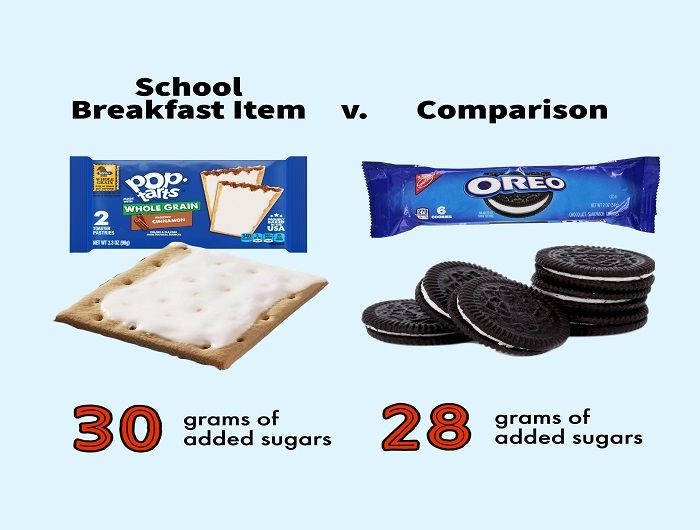Dessert for breakfast? Let’s give kids a healthy start at school

Pear in Mind: A blog in the public interest
When you envision a healthy school breakfast, what do you see? A sleeve of Oreo cookies? A cupcake? A Butterfinger bar?
These foods may not align with your idea of a healthy school breakfast, but companies are selling breakfast products to school meal programs with as much or more added sugars than you’d find in some popular desserts. For example, Kellogg’s twin-pack of Frosted Cinnamon Pop-Tarts Made with Whole Grain contain 30 grams of added sugars—about seven teaspoons—which is more than you’ll find in a 6 pack of Oreo cookies. A 2 oz. single-serving container of Post Holdings’ Marshmallow Mateys cereal has 23 grams of added sugars or about five and a half teaspoons—more sugar than a Butterfinger Bar. And a 2 oz. container of General Mills’ Lucky Charms cereal has 19 grams of added sugars or about four and a half teaspoons—as much as you’ll find in a Hostess Cupcake.
Kids deserve a healthier start to their school day. CSPI’s latest campaign asks Kellogg and other companies to stop selling products high in added sugars as breakfast foods to the school meals program. Instead, school breakfast products should meet the recommendations of the Dietary Guidelines for Americans, the once-every-five-years advice published by the U.S. Department of Agriculture and the Department of Health and Human Services.
The latest edition of the Guidelines recommends that Americans limit their daily added sugars intake to less than 10 percent of calories. In November, CSPI examined 2,000 products sold by 28 food companies into the K-12 school market. The report found that while most school breakfast products would meet the DGA-recommended added sugar standard, companies were still selling products to schools that blew past the 10 percent guideline.
In response, CSPI, the American Heart Association, and the American Public Health Association petitioned the USDA in February to set a standard for added sugars in school meals that is consistent with the Guidelines, but the USDA has yet to respond.
This new campaign appeals directly to food companies with a clear message: stop selling dessert for breakfast to school meal programs. Let’s give kids a healthy start at school.
Join our call for action here.
Tags
Topics

